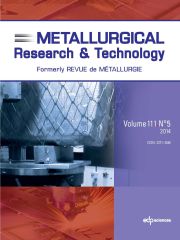No CrossRef data available.
Article contents
Influence of the alloying elements on crevice corrosion of stainless steels: a modeling approach
Published online by Cambridge University Press: 01 December 2011
Abstract
Crevice corrosion chemistry is modeled in galvanostatic mode using finite element method calculations. The results lead to the formulation of critical conditions for crevice propagation in terms of applied current and depassivation pHd. For a given stainless steel grade, the model predicts a linear relation IC(pHd) between a “critical propagation current” IC and the depassivation pHd. Detailed computing is performed to compare the behavior of duplex 2304, ferritic AISI 430 and austenitic AISI 304 stainless steels. The model is shown to capture correctly the major asymptotic behaviors and to fairly predict the better corrosion resistance of the duplex grade, which is attributed to its slower dissolution kinetics in acidic environment. When comparing duplex stainless steels to ferritic or austenitic ones, it is now evident that the dissolution law and the depassivation pHd are the key factors that control the resistance to crevice corrosion propagation.
Keywords
Information
- Type
- Research Article
- Information
- Copyright
- © EDP Sciences, 2011

